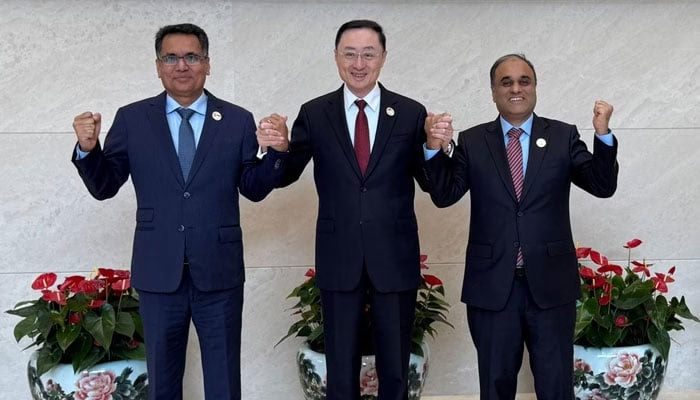In a significant move toward regional collaboration, Pakistan, China, and Bangladesh have launched a trilateral cooperation mechanism aimed at strengthening economic and diplomatic ties. The inaugural meeting took place in Kunming, China, and set the stage for enhanced partnership across various sectors, reflecting a shared commitment to peace, prosperity, and good neighborly relations.
A Landmark Trilateral Gathering
The historic meeting brought together senior officials from all three nations. China was represented by Vice Foreign Minister Sun Weidong, while Bangladesh sent Acting Foreign Secretary Ruhollam Siddique, and Pakistan was represented by Additional Foreign Secretary Imran Ahmed Siddique.
Pakistan’s Foreign Secretary Amna Baloch also joined the early session of the talks via video link. She commended the Chinese government for facilitating the meeting and reaffirmed Pakistan’s commitment to deepening its cooperation with both China and fellow South Asian nations.
Focus on Regional Growth and Connectivity
During the talks, the three countries reached a consensus to expand collaboration in key strategic areas, including:
- Trade and Investment
- Agriculture
- Digital Economy
- Environmental Protection
- Marine Sciences
- Green Infrastructure
These sectors were identified as vital for regional growth and resilience. The nations emphasized the need for mutually beneficial development and agreed to leverage each other’s strengths to address shared challenges like climate change, food security, and digital transformation.
Cultural and Educational Exchange
Recognizing the importance of soft diplomacy, the participating countries also agreed to promote cultural exchange, educational collaboration, and people-to-people connectivity. By investing in human capital and intercultural understanding, the trilateral mechanism aims to foster long-term relationships beyond the governmental level.
This aspect of the partnership is expected to create avenues for student exchanges, tourism growth, language learning initiatives, and joint research programs among universities and institutions.
Principles of Partnership
One of the most important aspects of the meeting was the emphasis on foundational principles. The three countries agreed that their cooperation will be rooted in:
- Openness
- Inclusiveness
- Non-interference
- Mutual Respect
- Good Neighborliness
This diplomatic tone signals an intention to build trust and maintain transparency as regional collaboration deepens. In a world of shifting geopolitical alliances, the reaffirmation of peaceful coexistence and mutual development stands out.
Institutional Framework for Implementation
To ensure the decisions taken during the meeting are realized, the countries agreed to establish a Joint Working Group. This body will be responsible for formulating action plans, coordinating initiatives, monitoring progress, and resolving any emerging issues.
The formation of this group demonstrates the commitment of all three parties to move beyond symbolic gestures and implement tangible, practical outcomes.
Strategic Significance of the Trilateral Pact
The launch of the Bangladesh-China-Pakistan trilateral mechanism comes at a time when regional cooperation is more critical than ever. As South Asia faces multiple challenges—from economic recovery post-COVID-19 to climate threats and digital divides—this alliance provides a new platform for joint solutions.
Moreover, the move reflects China’s broader strategy to enhance connectivity in the region under the Belt and Road Initiative (BRI). Bangladesh and Pakistan, both strategic BRI partners, are well-positioned to benefit from infrastructure investment and digital economy integration.
The Kunming meeting marks the beginning of what could become a highly influential partnership in Asia. While the immediate outcomes focus on diplomacy, trade, and culture, the long-term potential lies in shaping a cooperative, stable, and prosperous South Asian neighborhood.
As global politics evolve, regional alliances like this one are likely to play an increasing role in defining economic and security frameworks. With a strong start and clear objectives, the Pakistan-China-Bangladesh trilateral mechanism could become a model for regional diplomacy rooted in inclusivity, development, and mutual respect.



